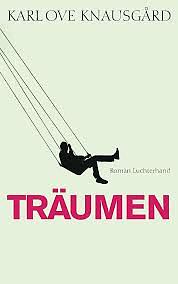You need to sign in or sign up before continuing.
Take a photo of a barcode or cover
Nach der Jugend; der lange unerfolgreiche Weg zum Schriftsteller (z.B. Akademie der Schreibkunst)
In which our hero is in Bergen, trying and (mainly) failing to become a writer. Alcohol shapes his life. Without alcohol he lacks confidence, with women and in himself. But when drunk he takes actions which can be disastrous. (The story ends with his marriage collapsing due mainly to an episode of infidelity when he was drunk). He finds fame with his first published novel, and love with his wife Tonje. He manages to mess up on both fronts.
Is this a novel? The details are too rich to be just a memoir, but as always he spares himself no shame, so perhaps the idea of fiction is a protective device, to an extent.
Is this a novel? The details are too rich to be just a memoir, but as always he spares himself no shame, so perhaps the idea of fiction is a protective device, to an extent.
3,5 tähteä.
Mielestäni tähän asti heikoin Knausgård, nyt pyöriskeltiin sen verran turhan pessimismin ja itsesäälin vallassa, että välillä olisi tehnyt mieli ravistella Karl Ovea. Herää, idiootti! Toisaalta kirjat, jotka herättävät tällaisia tunteita, ovat arvokkaita.
Kirjan viimeinen sata sivua sitten olikin sellaista kurkkua kuristavaa kipuilua ja tuttua Taisteluni-tunnetta, että olin hengästynyt ja hikinen, kun sain viimeisen sivun luettua. Itkettää ajatus, että seuraava osa on viimeinen ja täytyy siirtyä Knausgårdin elämästä takaisin omaansa.
Mielestäni tähän asti heikoin Knausgård, nyt pyöriskeltiin sen verran turhan pessimismin ja itsesäälin vallassa, että välillä olisi tehnyt mieli ravistella Karl Ovea. Herää, idiootti! Toisaalta kirjat, jotka herättävät tällaisia tunteita, ovat arvokkaita.
Kirjan viimeinen sata sivua sitten olikin sellaista kurkkua kuristavaa kipuilua ja tuttua Taisteluni-tunnetta, että olin hengästynyt ja hikinen, kun sain viimeisen sivun luettua. Itkettää ajatus, että seuraava osa on viimeinen ja täytyy siirtyä Knausgårdin elämästä takaisin omaansa.
informative
reflective
slow-paced
Plot or Character Driven:
Character
Strong character development:
Yes
Loveable characters:
No
Diverse cast of characters:
No
Flaws of characters a main focus:
Yes
It took me a while to get into this book, it has been a while since I read a book from this series so I don't remember if it is how I usually feel with the book in this series or I didn't really connect with this part of Karl Ove's life as much but as I went on I liked it more. It has all the elements I liked and talked about in the previous books, and it does a good job portraying life in your twenties, the search for identity and purpose, the sense of being young and having your whole life ahead of you while being made to make choices that will define your existence... It also gives a lot of insight into the writing process and life of a writer. I also wish these were done in more chronological order but that might just me my preference. At some point I will read the last one for sure.
Knowing there was only one more book left for me to read in Karl Ove Knaugaard's addictive series, I enjoyed fully immersing myself in the sensory world he so lushly describes. Often, I sat reading with a cup of freshly brewed hot coffee, sandwiched between cozy blankets while submitting myself to the pervasive darkness (both literal and figurative) that permeates so much of the book. I also let Karl Ove play the deejay for me. As he was constantly in and out of record shops as well as working at times reviewing music, the mention of late 80s/early 90s bands throughout the book was extensive. Taking this as a cue, David Bowie, XTC, The Sugar Cubes and The Waterboys were just some of the records I used as a soundtrack to transport me back to this time.
There were storylines that brought us back to familiar characters - his disintegrating relationship with his unpredictable father, his comfortable relationship with his reliable and loving mother and Yngve was present again, this time in quite a prominent role, as the two brothers were now in the same city of Bergen where Karl Ove moved once he'd gained acceptance at the Writing Academy there. There were lots of secondary characters, mostly fellow workmates or writers, but also some important women - the most notable being both Gunvor and Tonje with whom he shared his deepest and longest-lasting romantic relationships to-date. It was gratifying to see this turn in his life away from the awkward, fleeting encounters of his teenaged years to these more complex, committed adult relationships in his early twenties.
Also familiar was Karl Ove drowning his feelings of self-doubt while drinking to the point of blackouts. He experienced cringe worthy stomach-churning dread whenever he'd wake up from these overindulgent nights on the town that would last for several days. Though he always found the brief flashbacks and fragmented descriptions of what may have transpired unbearable, it was as though he had no self-control in this area and kept repeating the pattern. Unsurprisingly, this led to quite a few regrettable decisions, all of which compounded his already bad self-esteem.
But, really, the main focus of My Struggle #5 - the elusive string barely tethering Karl Ove to what he believed to be his true destiny - was his writing life. When Karl Ove was accepted into Bergen's Writing Academy, he went into the course believing himself to be a writer - it was his calling, it was all he wanted to do in life. So imagine his shock and disappointment when instead of being the star pupil, his work was characterized as immature, cliché, and juvenile by his fellow students. Never mind that he was the youngest in the program, never mind that he had less life experience from which to draw, ignore the fact that we can see, in retrospect, that he could grow and would soar in the literary world a few years down the road. Karl Ove took it all to heart and felt like a complete and utter failure. His sole desire was to be a literary fiction writer. Not a reviewer, an essayist or an academic. What frustrated him to his core was that it was the one type of writing he didn't seem to be able to produce. His frustration was all-encompassing. He would write for months on end, only to have a few sentences to show for it. He couldn't come up with ideas or didn't write about what he knew best or just couldn't seem to tap into one particular line that would lead itself into another and another and produce an actual story worth sharing with the world. Adding to his frustration were the successes many of his colleagues achieved, getting their writing published while he couldn't seem to fulfill his own burning dream.
Of course, from our vantage point here in the future, we can see that he's done it - that it all worked out for him in the end. That his first published novel would go on to win a prestigious Norwegian writers' prize and that the cover of this very book is bannered with "The International Literary Phenomenon" right there for all to see. But that's why this series is so addictive. Life is not just made up of major crowning moments and glittering achievements. It's both the ups and the downs that form a life. Karl Ove splays his whole life on the page: not just the good times, not just the moments where he shines brightly, but all of the horrible, messy, embarrassing character-building moments. He's sinks to the lowest points where he wonders if he can even go on, but I'm so glad he did. He may have struggled to tell a story worth reading in his younger years, but thankfully that struggle slowly waned and in its place was a whole cache of stories just aching to be told.
There were storylines that brought us back to familiar characters - his disintegrating relationship with his unpredictable father, his comfortable relationship with his reliable and loving mother and Yngve was present again, this time in quite a prominent role, as the two brothers were now in the same city of Bergen where Karl Ove moved once he'd gained acceptance at the Writing Academy there. There were lots of secondary characters, mostly fellow workmates or writers, but also some important women - the most notable being both Gunvor and Tonje with whom he shared his deepest and longest-lasting romantic relationships to-date. It was gratifying to see this turn in his life away from the awkward, fleeting encounters of his teenaged years to these more complex, committed adult relationships in his early twenties.
Also familiar was Karl Ove drowning his feelings of self-doubt while drinking to the point of blackouts. He experienced cringe worthy stomach-churning dread whenever he'd wake up from these overindulgent nights on the town that would last for several days. Though he always found the brief flashbacks and fragmented descriptions of what may have transpired unbearable, it was as though he had no self-control in this area and kept repeating the pattern. Unsurprisingly, this led to quite a few regrettable decisions, all of which compounded his already bad self-esteem.
But, really, the main focus of My Struggle #5 - the elusive string barely tethering Karl Ove to what he believed to be his true destiny - was his writing life. When Karl Ove was accepted into Bergen's Writing Academy, he went into the course believing himself to be a writer - it was his calling, it was all he wanted to do in life. So imagine his shock and disappointment when instead of being the star pupil, his work was characterized as immature, cliché, and juvenile by his fellow students. Never mind that he was the youngest in the program, never mind that he had less life experience from which to draw, ignore the fact that we can see, in retrospect, that he could grow and would soar in the literary world a few years down the road. Karl Ove took it all to heart and felt like a complete and utter failure. His sole desire was to be a literary fiction writer. Not a reviewer, an essayist or an academic. What frustrated him to his core was that it was the one type of writing he didn't seem to be able to produce. His frustration was all-encompassing. He would write for months on end, only to have a few sentences to show for it. He couldn't come up with ideas or didn't write about what he knew best or just couldn't seem to tap into one particular line that would lead itself into another and another and produce an actual story worth sharing with the world. Adding to his frustration were the successes many of his colleagues achieved, getting their writing published while he couldn't seem to fulfill his own burning dream.
Of course, from our vantage point here in the future, we can see that he's done it - that it all worked out for him in the end. That his first published novel would go on to win a prestigious Norwegian writers' prize and that the cover of this very book is bannered with "The International Literary Phenomenon" right there for all to see. But that's why this series is so addictive. Life is not just made up of major crowning moments and glittering achievements. It's both the ups and the downs that form a life. Karl Ove splays his whole life on the page: not just the good times, not just the moments where he shines brightly, but all of the horrible, messy, embarrassing character-building moments. He's sinks to the lowest points where he wonders if he can even go on, but I'm so glad he did. He may have struggled to tell a story worth reading in his younger years, but thankfully that struggle slowly waned and in its place was a whole cache of stories just aching to be told.
emotional
reflective
slow-paced
Plot or Character Driven:
Character
Strong character development:
Complicated
Loveable characters:
Complicated
Diverse cast of characters:
Complicated
Flaws of characters a main focus:
Yes
Knausgård is a weird author. This book moved me to tears, because it felt so raw and real at times. The book is also very boring from time to time, but that might even be intentional.
It's definitely an experience.
It's definitely an experience.
Inne på volym 5 skummar jag igenom väldigt många sidor. Det är lite tjatigt ibland. Den hade tjänat på att skäras ner med en tredjedel.
challenging
emotional
reflective
medium-paced
Plot or Character Driven:
A mix
Strong character development:
No
Loveable characters:
Complicated
Diverse cast of characters:
No
Flaws of characters a main focus:
Yes
It's upsetting to think that I only have one volume left.






